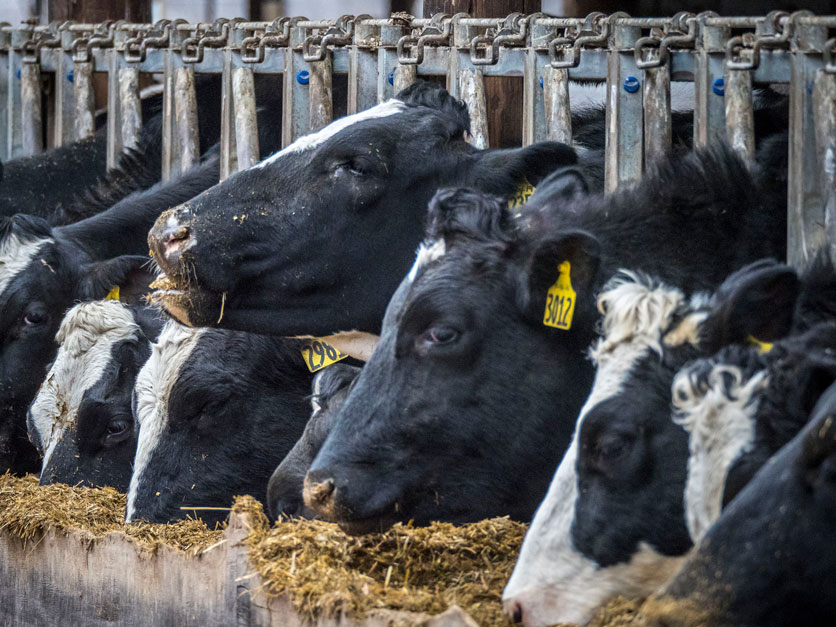Not much has been said about dairy quotas by either the U.S. or Canadian governments since Canada earlier this month submitted a proposal to alter the way it operates its tariff rate quotas for dairy imports, but both sides have been meeting on the issue over the past three weeks, sources tell Agri-Pulse.
Canada and the U.S. have had “several discussions” on how to move forward, one source said.
The Canadian proposal – a direct result of a USMCA panel decision in December – has not been made public. The U.S. has so far not shown any indication that it is considering retaliatory tariffs, although it has that right under USMCA rules.
Biden to talk supply chain disruptions in SOTU
President Joe Biden will use his first State of the Union address tonight to make the case that his administration is doing something about the supply chain disruptions that are vexing many sectors of U.S. agriculture.
According to the White House, Biden will frame the issue as rooted in a lack of competition in ocean shipping. Biden will say “carriers are now seeing record profits, while prices for American consumers and businesses have risen,” the White House says. Three groups of carriers control 80% of global container ship capacity and 95% of the capacity on key East-West routes, the White House says.
Biden will note a new effort by the Federal Maritime Commission and Justice Department to increase competition in the industry.
The White House is separately calling on Congress to pass reforms intended to relieve bottlenecks in container ports. The House passed the Ocean Shipping Reform Act in December, but the Senate has yet to act on the issue. The Senate Commerce Committee has scheduled a hearing on the bill for Thursday.
SCOTUS hears arguments on EPA’s ability to regulate GHGs from power plants
The Supreme Court wrestled with the issue of EPA’s authority to require greenhouse gas emission reductions from power plants at oral arguments Monday in a case that could have a big impact on the Biden administration’s climate goals.
Rural cooperatives are among those who want to see the court set strict limits on EPA’s authority. “Federal agencies are not free to rewrite statutory terms to accommodate policy desires that lack clear congressional directive,” said National Rural Electric Cooperative Association CEO Jim Matheson.
 Jim Matheson, NRECA CEO
Jim Matheson, NRECA CEOThree leading environmental groups, however, said “there is strong legal support for the EPA’s authority to regulate power sector pollution in order to protect clean air and public health.” In a news release, the Sierra Club, Environmental Defense Fund and Natural Resources Defense Council noted “power companies that would be subject to regulation argued before the court today and agreed that the EPA’s authority is consistent with the Constitution, the Clean Air Act” and previous Supreme Court decisions.
Nine commodities in focus as farm bill gets attention
The House Agriculture Committee continues its work toward the next farm bill with a hearing today for groups representing most of the commodities covered under Title One programs. The hearing comes as farmers are enjoying historically high prices but are also faced with soaring input costs and nagging supply chain disruptions.
The commodities that will be represented are: corn, soybeans, wheat, cotton, rice, peanuts, sugar, sorghum, sunflowers, barley and dry peas and lentils.
Vilsack urges equity commission to look forward, not back
The goal of USDA’s new equity commission is not "righting the wrongs of the past" but trying to prevent future wrongs by creating recommendations that will allow "permanent change and transformation" at the department, Ag Secretary Tom Vilsack said at the commission’s first meeting Monday.
"What I hope we get from this commission is a set of recommendations for how the USDA can be a place of equity; how it can be a place of inclusion; how it can be a place of making services and programs available to all who qualify, regardless of race or gender, national origin, sexual orientation or geography," Vilsack said. "The history of what has taken place in this department is important as it provides an opportunity to know where to look, where to examine [and] where to evaluate."
That’s not all: Vilsack also addressed USDA’s stalled effort to provide debt relief to historically underserved farmers. Vilsack noted that the relief process is on hold by court order after 13 lawsuits were filed challenging the policy. He said the USDA is contesting each of those suits and that one or more decisions are expected in the "near future."
Customs finds narcotic surprise in Lucky Charms
General Mills Lucky Charms cereal may be “magically delicious,” but that’s not why U.S. Customs and Border Protection tore open a box being shipped to the UK. Kary, a narcotics-sniffing dog, pointed out the cereal box known to normally contain colorful marshmallow bits, and officials then discovered quite a bit more – four pounds of marijuana.
“Our officers are very familiar with the many ways smugglers try to evade inspection,” said Thomas Mahn, a CBP director. “Officers learn to think creatively about where things might be hidden because drugs can be anywhere.”
He said it: “The quality of folks that we're picking is indicative of the time we're taking.” – Farm Service Agency Administrator Zach Ducheneaux at the National Farmers Union conference in Denver, explaining why there are still 19 FSA state executive director positions vacant.
Send comments, questions and tips to philip@agri-pulse.com.






